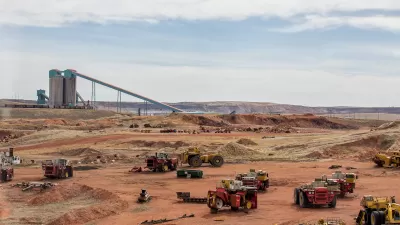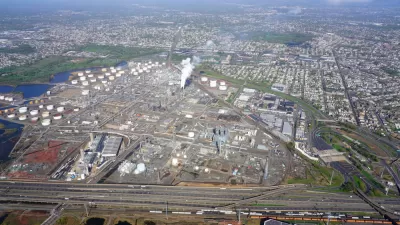A new policy from the Obama Administration asks government to calculate, and attempt to lower, their carbon emissions.

The White House's Council on Environmental Quality issued new guidance for government agencies on how to consider their impacts on climate change.
The guidelines add more concrete guidelines to an existing requirement that federal agencies conduct environmental reviews for all "major actions."
Agencies are now called on take a more quantitative approach, calculating the reduction or sequestering of carbon emissions that could be produced by a given federal action. They're also urged to consider more environmentally friendly alternatives.
As part of this more holistic framework, the Post adds:
The guidance also directs agencies to consider not only direct emissions of a project but also the “indirect” emissions. So, building a new road might encourage more people to drive, leading to more vehicular emissions.
More on the new guidelines, and on the original requirement—a sweeping 1969 act that is both "critical" and "exceedingly wonky"—in the Washington Post.
FULL STORY: From now on, every government agency will have to consider climate change

Planetizen Federal Action Tracker
A weekly monitor of how Trump’s orders and actions are impacting planners and planning in America.

Congressman Proposes Bill to Rename DC Metro “Trump Train”
The Make Autorail Great Again Act would withhold federal funding to the system until the Washington Metropolitan Area Transit Authority (WMATA), rebrands as the Washington Metropolitan Authority for Greater Access (WMAGA).

DARTSpace Platform Streamlines Dallas TOD Application Process
The Dallas transit agency hopes a shorter permitting timeline will boost transit-oriented development around rail stations.

San Francisco's School District Spent $105M To Build Affordable Housing for Teachers — And That's Just the Beginning
SFUSD joins a growing list of school districts using their land holdings to address housing affordability challenges faced by their own employees.

Car-Centric LA Suburb Looks to a Train-Oriented Future
City leaders in Rancho Cucamonga, the future western terminus of the Brightline West rail line to Las Vegas, want to reimagine the city as a transit-oriented, pedestrian-friendly community.

New Alaska Bitcoin Mine Would Burn as Much Energy as the State’s Largest Coal Plant
Fueled by “stranded” natural gas, the startup hopes to become the largest in the US, and to make Alaska an industry center.
Urban Design for Planners 1: Software Tools
This six-course series explores essential urban design concepts using open source software and equips planners with the tools they need to participate fully in the urban design process.
Planning for Universal Design
Learn the tools for implementing Universal Design in planning regulations.
Municipality of Princeton
Roanoke Valley-Alleghany Regional Commission
City of Mt Shasta
City of Camden Redevelopment Agency
City of Astoria
Transportation Research & Education Center (TREC) at Portland State University
US High Speed Rail Association
City of Camden Redevelopment Agency
Municipality of Princeton (NJ)





























